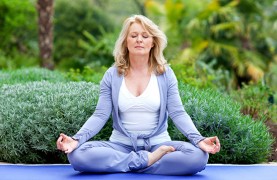 All women have different experiences during menopause, and the symptoms they report are often quite extensive. With all of the changes occurring in the body during this time, and the fluctuation of hormone levels, menopause may cause varying degrees of discomfort in some women. The addition of stress, whether it be caused by menopause or other external factors, can sometimes amplify these symptoms.
All women have different experiences during menopause, and the symptoms they report are often quite extensive. With all of the changes occurring in the body during this time, and the fluctuation of hormone levels, menopause may cause varying degrees of discomfort in some women. The addition of stress, whether it be caused by menopause or other external factors, can sometimes amplify these symptoms.
For this reason it’s important to find ways to relax throughout this period. Not only will this help with easing the symptoms during menopause, but it will also keep you feeling happier and better able to manage the other pressures in life. Here are some ways you can help your body and mind relax and be at ease throughout the menopausal period.
1. Exercise
A vigorous workout is not usually high on the priority list of women experiencing menopause. However it’s important to try and fit some exercise into your routine as a good sweat session will release endorphins, nature’s mood boosters. This can help elevate the moods of some people, while they simultaneously enjoy the good feeling of having just worked out their body and heart. The other benefit of regular exercise is that it can help with the body’s sleep cycle.
2. Yoga
Leading off from the exercise, a less strenuous form of movement that can bring relaxation during this time is yoga. A slower paced version, such as Hatha Yoga, can help to relax both the mind and body in some people. This combination of mental and physical balance can do wonders for stress levels, keeping those who practice the exercise feeling fit, happy, and healthy.
3. Massage
A good massage can help to break down toxins in the body while simultaneously relieving stiffness in the muscles. The reduction of muscle tension can be felt throughout the entire body, and you will come away feeling more relaxed and rejuvenated. For this reason a massage is a great way to relieve stress, anxiety, and even control blood pressure.
4. Meditation
The mind is just as important as the body when it comes to relaxation; in fact, it is the mind that often causes a buildup of stress. Practicing meditation can help some people reach a state of true relaxation, aiding in stress relief and having notable effects on mood and calmness throughout the day.
5. Breathing
While we all breathe, there is an art to proper breathing. Practicing deep breathing can help to calm the body and reduce stress and anxiety. Slow, controlled breathing at multiple times throughout the day can profoundly impact the stress levels of some people and induce a feeling of relaxation. Deep breathing is designed to relieve tension and stress and is often done in meditation and yogic practices.
6. Positive affirmation
Negative thoughts are normal, but many women don’t notice just how much their negative self-talk can affect them. Giving yourself positive affirmations when you start to hear negative thoughts entering your mind can have a direct impact on the anxiety you feel as a result. Saying these affirmations out loud is even more effective than just silently thinking them.
7. Talk
Talking to friends, family, or even a menopause therapist or counsellor can be a great way to manage your stress during menopause. Simply having someone to talk to that understands what you’re going through can be enough to put your mind and body at ease. Conversations don’t always need to be serious, however; talking to a friend that makes you laugh can have a positive effect, as laughter releases hormones that combat the stress hormone Cortisol.
8. Food
Maintaining a healthy and nutritious diet is paramount to keeping your body in good shape, and staying relaxed during menopause. Ensure you are getting sufficient vitamins, minerals, and eating from all the major food groups. Whole grain carbs and boost energy and mood, and a healthy diet can also prevent weight gain, which is a cause of anxiety and stress in many women experiencing menopause. Avoiding alcohol and coffee is also key to better quality sleep and reducing general tension in the body.
9. Sleep
Perhaps one of the most important factors when it comes to relaxation is getting a good night’s sleep. THis may seem easier said than done, with hot flushes and insomnia being common symptoms of menopause, but finding a routine for your body can help you get the quality of sleep you deserve. Stick to the same bedtimes and wake up times, avoid falling asleep while watching TV, and keep your room cool, dark, and quiet. With enough training, your body will adjust and the quality of your sleep will improve, resulting in a more relaxed state of being.
Taking small steps in each of these areas can have a real impact on how much you will be able to relax during menopause. Give yourself the time to practice these tips, and see if you can ease the menopause experience. If you feel that you are too busy, schedule a time and set up reminders for each activity. With time, you will form a habit of these, making it easier to carry on with them and integrate these practices into your life.